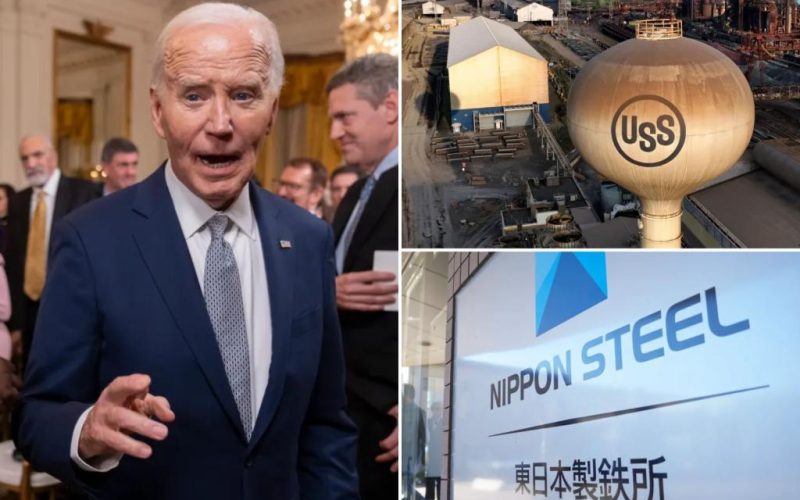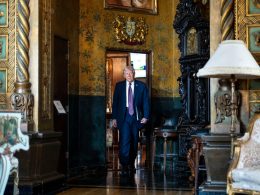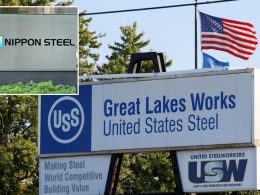US Steel and Japan’s Nippon Steel on Monday sued the US government in a bid to revive their $14 billion merger after President Biden blocked the deal last week – a move US Steel’s CEO called a “shameful” capitulation to a union boss.
The lawsuit, filed in a federal court in Washington, accused Biden and senior administration officials of corrupting the deal’s review process, and harming American steel workers by blocking the deal.
“Nippon Steel and US Steel are disappointed to see such a clear and improper exploitation of the country’s national security apparatus in an effort to help win an election and repay political favors,” the companies said in a joint statement on Monday.
“Nippon Steel and US Steel are entitled to a fair process and have been left with no choice but to challenge the decision and the process leading to it in court.”
Biden moved to block the merger on Friday after the Committee on Foreign Investment in the US punted on making a decision after a yearlong review process. The president said he was killing the merger on national security concerns.
“It is my solemn responsibility as President to ensure that, now and long into the future, America has a strong domestically owned and operated steel industry that can continue to power our national sources of strength at home and abroad,” Biden said in a statement on Friday, “and it is a fulfillment of that responsibility to block foreign ownership of this vital American company.”
The president’s move to axe the deal is a major use of executive power on a heavily-politicized election year issue. His announcement came with just over two weeks left in his term. He had previously vowed to keep US Steel American-owned, and President-elect Donald Trump pledged to crush the deal when he returns to office for his second term.
US Steel and Nippon are asking CFIUS to conduct a second review of the $14 billion merger.
The US steelmaker has warned that a failure to merge with the Japanese firm would put thousands of union jobs at risk. US Steel would have to shutter some of its mills, and potentially move its headquarters out of key swing-state Pennsylvania, the company said in September.
“President Biden’s action today is shameful and corrupt,” US Steel CEO David Burritt said in a statement on Friday, after Biden’ announcement. “He gave a political payback to a union boss out of touch with his members while harming our company’s future, our workers, and our national security.”
Some of Biden’s senior advisers have also expressed concerns that blocking the deal could hurt relations with Japan, a close ally and major investor in US businesses, according to The Washington Post.
“He insulted Japan, a vital economic and national security ally, and put American competitiveness at risk,” Burritt said. “The Chinese Communist Party leaders in Beijing are dancing in the streets.”
The lawsuit against the Biden administration also names Treasury Secretary Janet Yellen, who leads CFIUS, and Attorney General Merrick Garland.
In the suit, the companies argued that since Biden publicly disapproved of the deal months ago, the committee’s review of the merger was tainted. They also claimed that the panel refused to engage with the companies when they tried to offer solutions to ease national security concerns.
Nippon’s offer, which was first announced in December 2023, immediately faced heat from politicians and union leaders. Both Democratic and Republican lawmakers slammed the deal and treated it as a symbol of the erasure of US-owned companies.
The United Steelworkers union claimed it was blindsided by the merger, and argued Nippon was unlikely to honor the union’s contract and protect workers’ pensions.
US Steel shareholders approved the deal in April, but as the presidential election neared, political opposition to the bid only grew. Vice President Kamala Harris also spoke out against the deal during her campaign.
CFIUS reportedly hit a stalemate on its review of the deal on concerns that Nippon’s large size and overseas mills might threaten US Steel’s own output, according to correspondence between the committee and Nippon Steel viewed by The Wall Street Journal.
The steelmaking companies also filed a lawsuit on Monday against Cleveland-Cliffs, a US steel company that previously tried to buy US Steel, and its chief executive, along with David McCall, the president of the powerful United Steelworkers union. The suit alleges Cleveland-Cliffs and the union boss colluded to take down the deal.
CFIUS, the committee created in the 1970s to review foreign investments for national security concerns, has often blocked Chinese investments on political influences. Since 1990, US presidents have blocked eight other foreign deals, according to the Congressional Research Service.
US Steel and Nippon said Biden’s involvement was a slap in the face to Japan, a longtime US ally.
After Biden’s announcement on Friday, Japan’s prime minister said the decision could impact future Japanese investments in the US.
“It is unfortunately true that there are concerns being raised within Japan’s industrial world over future Japan-US investment,” Prime Minister Shigeru Ishiba told reporters, per Japanese media. “It’s something we have to take seriously.”
He said the US needs to be able to “explain clearly” why the deal poses a national security concern.
“It would be inappropriate for the Japanese government to comment on the management of an individual company that was under review as per US domestic law…but we will strongly call on the US government to take steps to dispel these concerns,” Ishiba added.








